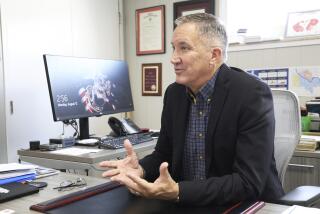If Then Was Now, Mr. Miles Wouldn’t Have a Prayer
- Share via
Mr. Miles, in his way, believed in academic freedom.
He was my fifth-grade teacher, and long before I entered his classroom, Mr. Miles was a legend at Santa Ana’s Herbert Hoover Elementary School, the closest thing we had to Mr. Chips. He saw it as his sacred duty to teach us to love our country. Mr. Miles had us listen to 45-r.p.m. records that featured heroic tales of Medal of Honor winners and he required each and every student to recite the Gettysburg Address from memory. For extra credit, my pal Brien Dodd, a straight-A student, memorized and recited Longfellow’s lengthy “Midnight Ride of Paul Revere.”
Last night I called Brien in hopes of confirming a fuzzy memory--that Mr. Miles, each and every morning, would lead us in prayer. This was a few years after the 1962 Supreme Court decision in Engel v. Vitale , which forbade organized school prayer, so Mr. Miles was something of a rebel.
We kids, of course, were oblivious to grown-up stuff. We would dutifully bow our heads and pray, or pretend to.
*
School prayer is one of those issues from the ‘60s that is erupting anew in the ‘90s. It jumped back into the headlines after the November election, and though school prayer isn’t part of the Republican “contract,” it’s simmering on the back burner. This summer, Congress will weigh legislation concerning school prayer, or perhaps a “moment of silence.” For Rep. Howard P. (Buck) McKeon (R-Santa Clarita), it promises to be a season of soul-searching.
McKeon is a cowboy-booted conservative who was chairman of the recent inauguration festivities for new House Speaker Newt Gingrich. He’s also a devout Mormon who has shown a keen interest in protecting the rights of the religious. Last summer in Washington he crusaded against new guidelines proposed by the federal Equal Employment Opportunity Commission that, in his view, equated proselytizing with harassment. Some legal opinions found the guidelines to be so aggressive that it would forbid workers to keep a Bible on their desk, or to wear a Star of David.
The bipartisan outcry forced the EEOC to reconsider its proposal. But when I visited McKeon last summer, his crusade had me wondering about his feelings on school prayer. The congressman frowned and shrugged and said the Supreme Court had long ago made it a moot issue. He seemed disappointed.
Now that school prayer is back on the agenda, I called McKeon again.
A thoughtful man who doesn’t talk in sound bites, McKeon noted that the House’s resident champion of school prayer, Rep. Ernest Istook Jr. (R-Okla.), is a fellow Mormon. McKeon, however, made it clear that he isn’t ready to embrace the cause--not yet, anyway.
One reason is the Mormons’ own history of persecution. In the 1800s, mobs killed the Mormon prophet Joseph Smith and many of his followers because their beliefs were so controversial. Even today, McKeon is painfully aware that many fellow Christians regard the Book of Mormon as something sinister. When he ran for Congress, one of McKeon’s opponents charged that he is not a Christian. Although Mormonism is typically viewed as a conservative, temperate faith, McKeon notes that “the fundamentalists are the ones who are saying we’re not Christian. . . .”
“It bothers me in this day and age of enlightenment,” McKeon says. “I met with a minister in our valley who has a vendetta against our church. And he is not alone, and I know there are others. . . . They say we’re of the devil.”
Advocates of school prayer typically suggest that minority faiths should tolerate the right of the majority in such matters. McKeon is a wealthy, conservative, white male Christian. But he is also a member of a religious minority, so debate over religious freedom is more than an abstraction. Separation of church and state is meant to protect the minority. McKeon, sitting on the fence, wants to talk it over with Rep. Istook. He finds himself wondering whether a moment of silence would satisfy everybody. A time of silence, after all, is seldom a bad idea.
*
Brien can still recite some of Longfellow’s verse but, alas, he couldn’t remember whether Mr. Miles led us in prayer. We both remember with certainty that Mr. Miles expressed his Christian devotion freely and often; I’m 98% sure that prayers were part of this. My memory is my memory, fuzzy though it is.
I have a theory about that fuzziness. Except for that macho tune “Onward Christian Soldiers,” church and Sunday school were a bore. So I probably just daydreamed through the prayers. Those few words, so meaningful to Mr. Miles, didn’t mean much to me.
Or maybe I was allergic. You see, several years earlier, I was taught that bedtime prayer with those frightening words: “If I should die before I wake. . . .”
Even today, I have trouble falling asleep.
More to Read
Sign up for Essential California
The most important California stories and recommendations in your inbox every morning.
You may occasionally receive promotional content from the Los Angeles Times.













